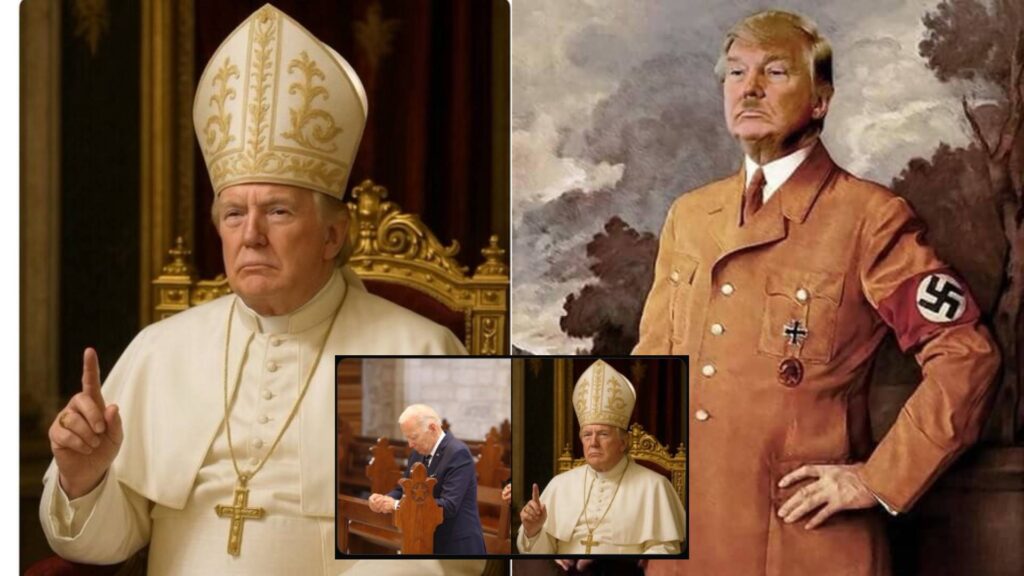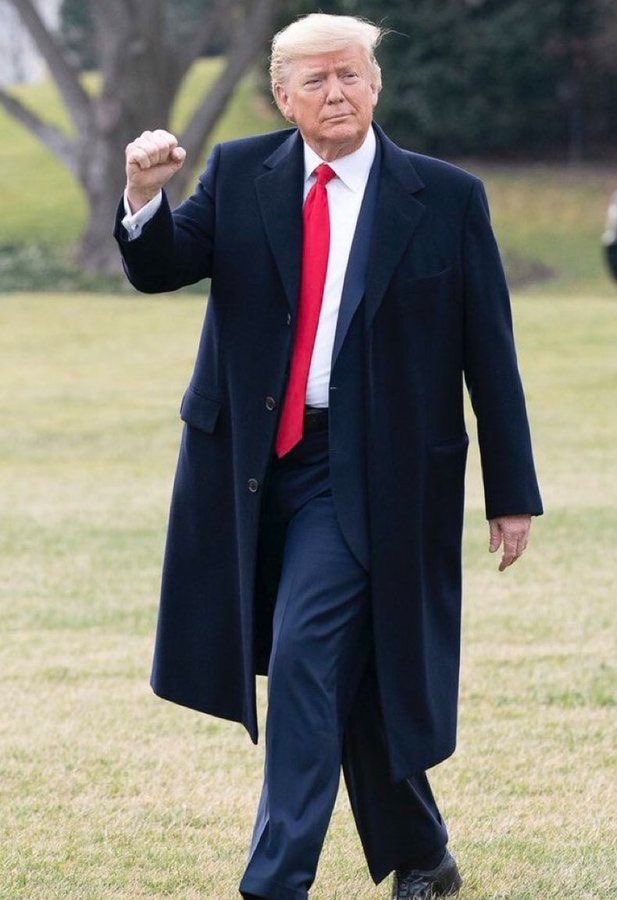After Declining a Third Presidential Run, Trump Declares Ambition to Become Pope
In a move that has stunned political analysts, religious scholars, and the global public alike, former U.S. President Donald J. Trump announced on April 20, 2025, that he would not seek a third term as President of the United States. Instead, he set his sights on an unprecedented and audacious goal: to become the Pope, the spiritual leader of the world’s 1.4 billion Catholics. This declaration, made during a rally in Palm Beach, Florida, has sparked a firestorm of reactions, ranging from incredulity to amusement, while raising serious questions about Trump’s intentions, the feasibility of his ambition, and the implications for both American politics and the Catholic Church. This article explores the context of Trump’s announcement, the historical and procedural barriers to his papal aspiration, the public and institutional responses, and the broader cultural significance of this extraordinary claim.
The Context of Trump’s Announcement
Trump’s decision to forego a third presidential run came as a surprise to many, given his dominant presence in American politics since his first campaign in 2015. After serving as the 45th and 47th President, Trump’s political career has been marked by polarizing policies, legal battles, and a fiercely loyal base. His announcement not to run again was framed as a desire to “explore new horizons” and “make history in ways no one has before.” In characteristic fashion, Trump followed this with a bombshell: “I’m going to do something bigger than the presidency. I’m going to become the Pope. The Vatican needs a winner, and nobody wins like me.”
The statement, delivered with Trump’s trademark bravado, was initially met with laughter from the crowd, many of whom assumed it was a jest. However, Trump doubled down in subsequent interviews, including a Fox News segment on April 22, 2025, where he claimed, “The Catholic Church needs strong leadership, and I’ve got the best leadership. I’ve got the best words, the best ideas. I’d be a tremendous Pope.” He cited his deal-making skills, global influence, and “tremendous faith” as qualifications, while dismissing concerns about his lack of ecclesiastical credentials.
This announcement comes at a time of transition for the Catholic Church. Pope Francis, now 88, has faced health challenges, prompting speculation about the next papal conclave. Trump’s claim, though seemingly outlandish, taps into a moment of uncertainty, positioning him as a disruptive figure in a centuries-old institution. It also reflects his knack for capturing attention, a skill honed through decades in business, reality television, and politics.
The Historical and Procedural Barriers
Trump’s ambition to become Pope faces insurmountable obstacles, rooted in the Catholic Church’s history, canon law, and traditions. To understand the improbability of his claim, one must examine the requirements for papacy:
-
Eligibility Criteria: According to Canon 332 of the Code of Canon Law, any baptized male Catholic can theoretically be elected Pope, though in practice, the position is almost always filled by a cardinal under the age of 80. Trump, a Presbyterian who has never publicly converted to Catholicism, would need to be baptized and confirmed as a Catholic, a process that typically takes months or years. Even then, his lack of theological training or clerical experience makes his candidacy unthinkable within the Church’s framework.
-
The Conclave Process: The Pope is elected by the College of Cardinals in a secretive conclave, guided by prayer and deliberation. Cardinals, who are senior Church leaders, vote based on a candidate’s spiritual leadership, doctrinal orthodoxy, and ability to guide the global Church. Trump, with no ecclesiastical background and a public persona defined by political divisiveness, would be an unlikely choice for even a single cardinal’s vote.
-
Historical Precedent: While non-clerics have been elected Pope in the past—such as Celestine V in 1294, a hermit with no prior Church office—such cases are exceedingly rare and occurred in vastly different historical contexts. The modern papacy requires administrative expertise, diplomatic finesse, and theological depth, none of which align with Trump’s resume.
-
Citizenship and Residency: The Vatican is a sovereign city-state, and the Pope serves as its head of state. Trump’s American citizenship and lack of ties to the Vatican further complicate his eligibility. The Church has not elected a non-European Pope since the 8th century, and a non-Catholic, non-clerical American would be unprecedented.
Beyond these procedural hurdles, Trump’s personal history poses additional challenges. His public statements on issues like abortion, marriage, and immigration have often clashed with Catholic social teaching. His three marriages, business controversies, and ongoing legal battles, including a pending sentencing in a New York hush-money case, would likely be viewed as disqualifying by the Church’s standards of moral leadership.
Public and Institutional Responses
The reaction to Trump’s announcement has been a mix of ridicule, concern, and fascination. On social media platforms like X, users posted memes comparing Trump to fictional popes or joking about a “MAGA Vatican.” A post by @PatriotVoiceUSA quipped, “Trump as Pope? He’d probably rename the Vatican ‘Trump City’ and sell golden mitres!” Others, like @FaithfulCatholic, expressed outrage, calling the claim “blasphemous” and disrespectful to the papacy’s sacred role.
Political commentators have been equally divided. Conservative outlets like Newsmax praised Trump’s boldness, with one pundit suggesting he was “trolling the establishment” to highlight the Church’s need for reform. Liberal media, such as CNN, framed the announcement as a sign of Trump’s desperation for relevance after opting out of the 2028 presidential race. The New York Times published an op-ed titled “From White House to Holy See: Trump’s Papal Fantasy,” arguing that the claim reflects his inability to relinquish the spotlight.
The Catholic Church has remained largely silent, with the Vatican issuing no official statement. However, Cardinal Timothy Dolan of New York, in a brief interview with Catholic News Service on April 23, 2025, dismissed the idea with humor: “Mr. Trump’s enthusiasm is noted, but I think the Holy Spirit has other plans.” Catholic scholars, such as those at Georgetown University, have called the announcement a “publicity stunt” that misunderstands the papacy’s spiritual and institutional nature.
Internationally, the response has been one of bemusement. Italian newspaper La Repubblica ran a satirical cartoon depicting Trump in papal vestments, while the BBC questioned whether the announcement was a serious bid or a marketing ploy for Trump’s brand. Some speculated that Trump might be eyeing a reality TV project or a book deal, leveraging the controversy to maintain his media dominance.
Cultural and Political Implications
Trump’s papal ambition, while far-fetched, carries significant cultural and political weight. It underscores his ability to dominate discourse, even in retirement from electoral politics. By targeting the papacy—a position of global moral authority—Trump positions himself as a figure unbound by conventional limits, appealing to supporters who view him as a disruptor of elites, including religious ones.
The announcement also highlights the intersection of politics and religion in modern America. Trump’s evangelical base, which propelled his presidential victories, may see his papal claim as an extension of his “divinely inspired” leadership, as some supporters have described him. However, this risks alienating Catholic voters, who make up roughly 20% of the U.S. electorate and have historically been wary of Protestant figures claiming Catholic roles.
For the Catholic Church, Trump’s declaration poses a delicate challenge. While the Vatican is unlikely to engage directly, the controversy could fuel debates about the Church’s role in a polarized world. Pope Francis has emphasized humility and dialogue, qualities at odds with Trump’s bombastic style. The Church may use this moment to reaffirm its focus on spiritual leadership, distancing itself from political spectacles.

Trump’s Motivation: Ambition or Performance?
What drives Trump’s papal ambition? Several theories emerge. First, it could be a calculated move to maintain relevance. After declining a third presidential run, Trump faces the prospect of fading from the political stage. Claiming the papacy, even in jest, keeps him in headlines and reinforces his image as a larger-than-life figure. Second, it may reflect genuine hubris. Trump’s history of bold claims—such as calling himself the “best president ever”—suggests a belief in his ability to conquer any arena, including the Vatican.
Alternatively, the announcement could be a satirical critique of institutional power. Trump has long railed against “globalist” establishments, and the Catholic Church, with its vast influence, could be a target for his populist rhetoric. By mocking the papacy, he may aim to expose perceived weaknesses in its leadership or appeal to followers skeptical of traditional authority.

Conclusion
Donald Trump’s declaration that he wants to become Pope after declining a third presidential run is a quintessential example of his ability to shock and captivate. While the ambition is implausible—barred by canon law, tradition, and Trump’s own background—it reveals much about his persona and the current cultural landscape. The announcement has sparked laughter, debate, and reflection, highlighting the tension between politics, religion, and celebrity in the 21st century. For the Catholic Church, it is a reminder of the papacy’s enduring mystique; for Trump’s supporters, it is another chapter in his saga of defying expectations. Whether a stunt, a dream, or a critique, Trump’s papal bid ensures that he remains, as ever, at the center of the global stage.





